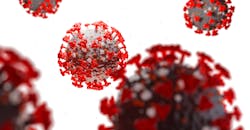In a sign that the government sees the end of the COVID-19 outbreak coming soon, the White House announced they would begin winding down their coronavirus task force’s operations over the course of the month. Vice President Pence, the head of the task force, said in comments to the press that the group was currently discussing “what the proper time is for the task force to complete its work and for the ongoing efforts to take place on an agency by agency level.”
President Trump himself put the spotlight on a well-known manufacturing company making PPE. He spent part of Tuesday visiting a Honeywell factory in Phoenix, Arizona. The North Carolina-based aerospace contractor announced in March it would expand its repertoire to include N95 respirator masks, which it’s currently producing for the U.S. Department of Health and Human Services. The President elected not to wear a mask, but aides noted that he had been tested for coronavirus before leaving on the trip.
Meanwhile, according to an Associated Press analysis using data collected by John Hopkins University, infection rates in the United States are rising outside the New York City metropolitan area, which became a countrywide center of the virus during April. According to the analysis, confirmed infections in the United States are currently over 20,000 per day, and more than a thousand people are dying of the virus in the United States every day.
Employers Expect Furloughed Workers to Return Within 6 Months
The impact of the coronavirus has been sharp and dramatic. More than 30 million Americans have filed for unemployment insurance since it began. But according to a new index released by SHRM, the Society for Human Resource Management, and Oxford Economics, a full 99% of employers expect furloughed workers will be back at work within half a year. The index shows that even while layoffs continue, a significant amount of employers expect the impact to be a short-lived one for at least one group of employees. Read the full story here.
Financial Support for SMEs and Smart Companies
The Paycheck Protection Program, a fund of money recently passed by Congress with billions of dollars intended just for small and medium businesses, is a welcome change to bailout priorities from the 2009 financial crisis. “It is sad that it takes a national crisis to give this segment of manufacturing the visibility it deserves, but it is what it is,” says Paul Ericksen, IndustryWeek’s Supply Chain Advisor. According to Ericksen, the dark cloud of the COVID-19 crisis could lead to a silver lining where smaller manufacturers receive their due as essential enterprises. Read the full story here.
Meanwhile, Yair Holtzman, practice leader of Anchin’s R&D Tax Credits Group, explains how companies can make innovating their production lines affordable by taking advantage of R&D tax credits. “The R&D tax credit, first enacted by Congress in 1981, incentivizes an enormous range of activities for companies of all sizes for work done within the United States,” writes Hotzlman. Yet the credit is currently underutilized among eligible companies. Read the full story here.
Ford, FCA Post Huge Losses to Viral Impact
It’s earnings season again, and there’s plenty of bad news to go around. Fiat-Chrysler Automobiles N.V. released its first quarter 2020 earnings today, in which it revealed it had lost 1.7 billion euros, $1.86 billion, over the course of the quarter. CEO Mike Manley said the virus “has had, and continues to have, a significant impact on our operations.” Worldwide demand was down, and FCA worldwide combined shipments of cars were down 21%.
Ford Motor Co. announced April 28 that it had similar net loss over the quarter of $2 billion, which it also attributed to fallout from the virus. In a call to investors, Ford CEO Jim Hackett praised his company’s production of alternative products needed to fight the outbreak, including ambulances, face shields, ventilators, and respirators. Read the full story here.
About the Author
Ryan Secard
Associate Editor
Ryan Secard joined Endeavor B2B in 2020 as a news editor for IndustryWeek. He currently contributes to IW, American Machinist, Foundry Management & Technology, and Plant Services on breaking manufacturing news, new products, plant openings and closures, and labor issues in manufacturing.
